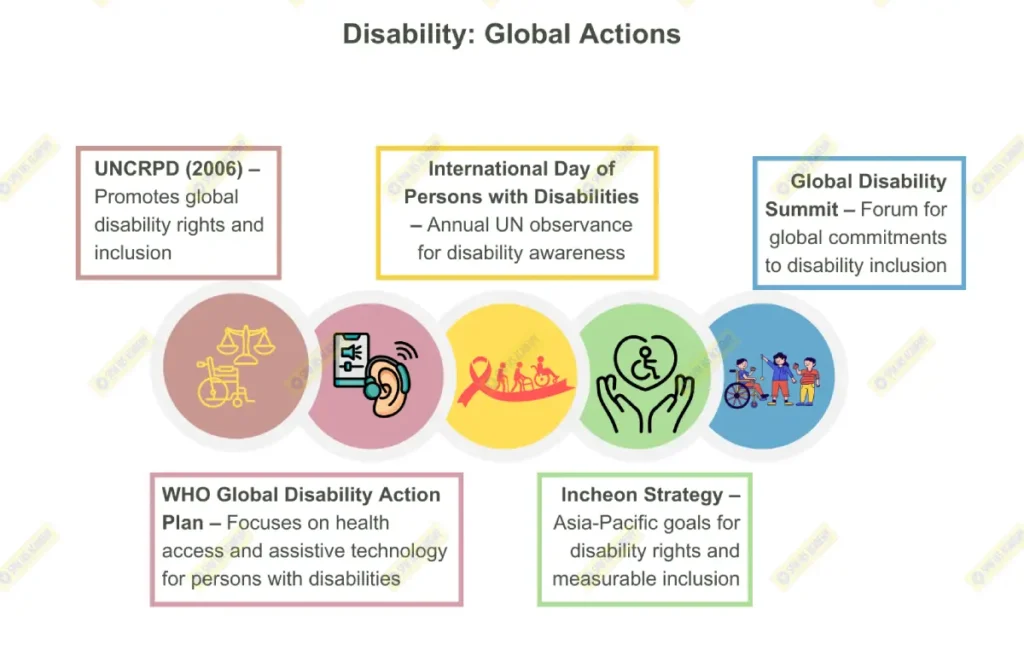Persons with Disabilities (PwDs) in India face several challenges in accessing essential services, stemming from social, infrastructural, and policy limitations. The Rights of Persons with Disabilities (RPwD) Act, 2016 was enacted to address these barriers by legally recognizing the rights of PwDs and mandating inclusive, accessible provisions across services. This Act, along with recent initiatives, plays a key role in advancing equality and empowerment for PwDs.

Challenges Faced by PwDs in Accessing Essential Services
1. Lack of Accessible Infrastructure:
- Many public spaces, including government buildings, hospitals, and transportation facilities, remain inaccessible to PwDs. Basic facilities like ramps, tactile paths, and accessible toilets are often missing or poorly maintained.
- Example: While the Accessible India Campaign aimed to create barrier-free infrastructure, implementation has been slow, and a recent Parliamentary Committee report highlighted that less than half of government buildings had been made fully accessible.
2. Barriers in Healthcare Services:
- PwDs often encounter challenges in obtaining healthcare, including communication barriers, limited medical equipment suited for PwDs, and untrained healthcare staff.
- During the COVID-19 pandemic, PwDs faced greater obstacles in accessing healthcare and vaccination services. Reports indicated insufficient provisions for PwDs at vaccination centers, such as lack of priority queues or accessible information formats.
3. Educational and Employment Inequities:
- Education for PwDs suffers from inadequate resources, lack of trained educators, and limited inclusive curricula. Employment opportunities are also restricted by a lack of workplace accommodations and employer awareness, resulting in high unemployment rates among PwDs.
- Example: A 2022 study by the National Centre for Promotion of Employment for Disabled People (NCPEDP) found that employment rates for PwDs remained low despite mandates for reservations, highlighting the need for effective implementation of workplace inclusivity.
4. Social Stigma and Discrimination:
- PwDs in India frequently face social stigma, resulting in discrimination and exclusion from social services and community engagement. This societal attitude often discourages them from seeking the services they need or fully participating in public life.

Rights of Persons with Disabilities Act, 2016: Facilitating Rights for PwDs
The RPwD Act, 2016 is a comprehensive legislative framework aimed at addressing these challenges by promoting equality, accessibility, and empowerment for PwDs. Key provisions and impacts of the Act include:
Expanded Definition and Reservation Quotas:
- The Act expands the definition of disability from 7 to 21 recognized disabilities, covering a wider range of physical and mental disabilities, including autism, Parkinson’s disease, and specific learning disabilities.
- It mandates 4% reservation in government jobs and 5% in educational institutions for PwDs, aiming to bridge educational and employment gaps.
Right to Accessibility:
- The Act emphasizes the right to access physical infrastructure, information, and communication services. Public buildings, transportation, and educational institutions are required to be accessible, with a timeline for compliance set under the Accessible India Campaign.
- Example: While progress has been uneven, some cities like Bengaluru and Mumbai have taken steps to make public transport more accessible with wheelchair-friendly buses and improved pedestrian pathways.
Equal Rights in Education and Employment:
- The Act promotes inclusive education by mandating accessible educational infrastructure, trained educators, and individualized learning. In employment, it requires organizations to ensure equal opportunities and reasonable accommodations for PwDs.
- Example: The Act led to the creation of the Equal Opportunity Policy, which requires all organizations with 20+ employees to outline workplace accommodations for PwDs, although enforcement remains a challenge.
Provision for Legal Safeguards and Redressal Mechanisms:
- The Act protects PwDs from discrimination in all walks of life, including healthcare, housing, and social services, and introduces penalties for discrimination or denial of access to services. It also establishes a Special Court in every district for faster redressal of grievances.
- The Act also mandates the appointment of a Chief Commissioner for Persons with Disabilities at the national level and State Commissioners to monitor implementation and address complaints.
The RPwD Act, 2016 lays a solid foundation for the empowerment of PwDs in India, mandating accessible infrastructure, educational and employment opportunities, and legal safeguards. However, effective implementation and heightened public awareness remain critical challenges.











